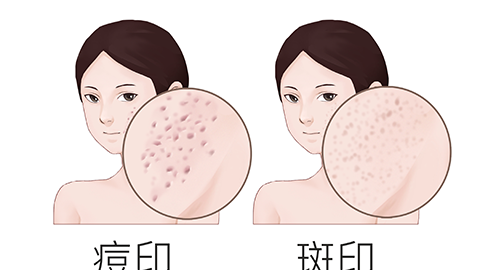How to remove acne marks and scars on the skin
Acne marks and scars on the skin may be caused by improper skincare, overactive sebaceous glands, hormonal imbalances, folliculitis/polycystic ovary syndrome, and can be treated according to different situations. It is recommended to visit a hospital promptly and follow medical advice for treatment.

1. Improper skincare: Improper skincare habits or irritants can damage the skin barrier, leading to skin sensitivity and inflammation, thus causing acne. After the inflammation heals, poor skin repair may lead to the formation of acne marks. Discontinue the use of potentially irritating skincare products and choose gentle, non-irritating ones.
2. Overactive sebaceous glands: During puberty or periods of hormonal fluctuations, sebaceous glands may overproduce oil, clogging pores and triggering acne, which can lead to acne scars and marks. Use topical products containing ingredients such as salicylic acid and benzoyl peroxide to help clear pore blockages and reduce sebum production.
3. Hormonal imbalance: Endocrine disorders and elevated androgen levels can stimulate excessive sebum production by sebaceous glands, promoting the occurrence of acne. Hormonal imbalances can also affect the skin's healing ability, making acne marks difficult to fade. Apply topical skincare products containing vitamin C, such as vitamin C serums, to help lighten acne marks.
4. Folliculitis: Bacterial or fungal infections of the hair follicles can cause localized inflammatory reactions, damaging the surrounding tissue and resulting in acne. During the healing process, pigmentation may occur, leading to acne marks and scars, possibly accompanied by symptoms such as redness, swelling, pain, and pus-filled bumps. It is recommended to use medications such as mupirocin ointment, ketoconazole cream, and fusidic acid sodium ointment under a doctor's guidance to alleviate discomfort.
5. Polycystic ovary syndrome: This condition is usually related to environmental and metabolic factors. Changes in hormone levels can lead to recurrent acne and the formation of acne marks and scars, accompanied by symptoms such as menstrual irregularities and increased body hair. It is recommended to follow medical advice to use medications such as dydrogesterone tablets, letrozole tablets, and bromocriptine mesylate tablets.
During treatment, proper skincare and sun protection are essential to avoid excessive UV exposure to the skin. At the same time, maintaining good lifestyle and dietary habits can also aid in skin recovery and the fading of acne marks and scars.









